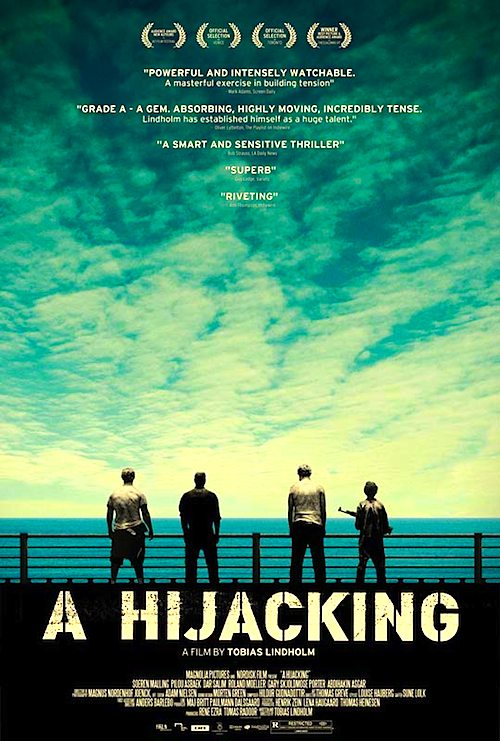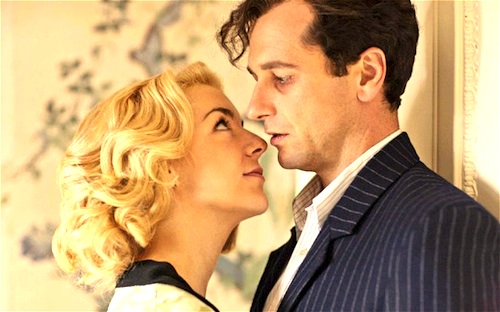By Joe Bendel. They do not teach you how to negotiate with pirates in MBA courses, but perhaps they soon might. After all, this film is inspired by two real life incidences of Danish cargo ships taken hostage by Somali pirates. The negotiation process will be an ordeal both for the captive crew of the MV Rozen and their CEO in Tobias Lindholm’s edge-of-your-seat thriller, A Hijacking, which opens this Friday in New York at Film Forum.
Mikkel Hartmann is retiring from seafaring to spend more time with his family. Ordinarily, he serves as the ship’s cook, but when hijackers commandeer the vessel, they use him to communicate with the corporate office. He will be talking to Peter C. Ludvigsen, a media darling CEO with a knack for negotiating hard terms. However, bringing back his crew will be the greatest challenge of his career.
 The company would willingly pay the ransom demanded, but according to their consultant (played by real life hostage negotiator Gary Skjoldmose Porter) it is not that simple. If they immediately pay-up, the pirates are likely to thank them for the “down payment” and promise to get back to them regarding the full balance. Instead, Ludvigsen must convince them they are getting every last cent they can possible extract from the company. Counter-intuitively, protracted negotiations are in the best interests of the men and the firm. Of course, it will not be a pleasant experience for any of the Danes.
The company would willingly pay the ransom demanded, but according to their consultant (played by real life hostage negotiator Gary Skjoldmose Porter) it is not that simple. If they immediately pay-up, the pirates are likely to thank them for the “down payment” and promise to get back to them regarding the full balance. Instead, Ludvigsen must convince them they are getting every last cent they can possible extract from the company. Counter-intuitively, protracted negotiations are in the best interests of the men and the firm. Of course, it will not be a pleasant experience for any of the Danes.
Scrupulously realistic, Hijacking acts as a bracing corrective to the cathartic satisfaction of action movies. It is simply not realistic to expect Roger Moore’s Ffolkes to launch a high seas rescue mission. The logistics are too complicated and life is too cheap for hostage takers. The film is also likely to run afoul of the professionally offended, because it portrays the Somali pirates as a callous, violently erratic lot. Nor does it whitewash their Muslim faith. Of course, that is precisely the reality sailors such as the Rozen crew must live with every day.
Cranking up the tension like a vice, Lindholm puts so much pressure on his characters they almost turn into diamonds. This is an exhausting nail-biter of a film, but somehow it seems far quicker than its ninety-nine minutes, despite the agonizing nature of the drawn out months-long negotiation. That is just great filmmaking.
There is also a truly award-worthy performance from Søren Malling as Ludvigsen. It is a brilliant depiction of the mighty humbled, precisely because of his genuine humanity. Never clichéd, Malling’s work is easily the most compelling big screen portrayal of a business leader in years (if not decades). In fact, Hijacking features strong ensemble work all around, most definitely including Abdihakin Asgar as Omar, the pirates’ devilishly manipulative negotiator. He is an unforgettable villain (though “villain” might not be a strong enough term).
The pirates might come from mean circumstances, but Lindholm never apologizes for their crimes. Instead, the victims of A Hijacking are Hartmann and his crewmates. Clear headed and relentlessly gripping, it is easily the pick of the week and might be the best theatrical release of the year, so far. Highly recommended, A Hijacking opens this Friday (6/21) in New York at Film Forum.
LFM GRADE: A
Posted on June 17th, 2013 at 12:53pm.
